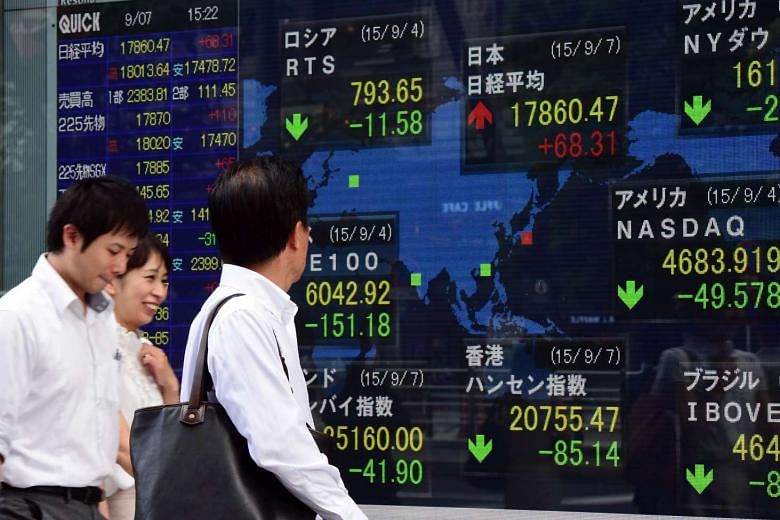TOKYO (BLOOMBERG) - Japan's economy contracted last quarter less than initially estimated, thanks to a buildup in inventories that risks damping a rebound.
Gross domestic product shrank at an annualized 1.2 per cent pace in the three months through June from the first quarter, less than the 1.6 per cent drop reported last month, the Cabinet Office said on Tuesday (Sept 8) in Tokyo. Economists had estimated a 1.8 per cent contraction.
Businesses reduced investment more than first estimated, in a rebuff to Prime Minister Shinzo Abe's call for Japanese companies to deploy their record cash holdings and a surge in profits into capital spending. Also dragging on the economy was consumption - even after an advance in wages. Overseas, Japan is facing growing risks from a slowdown in China, its biggest trading partner.
"Companies are still struggling to reduce stockpiles in the face of weak demand at home and abroad," said Junichi Makino, an economist at SMBC Nikko Securities Inc. "The government will probably compile about 2.5 trillion (S$30 billion) yen worth of stimulus in an economic package around October," he predicted.
The increase in private inventories added 0.3 percentage point to quarterly GDP, more than the 0.1 point initially estimated, according to the revised figures.
Capital investment fell 0.9 per cent in April-to-June from the previous quarter, against an initial estimate of a 0.1 per cent decline. Private consumption declined 0.7 per cent, compared with the preliminary 0.8 per cent drop.
Japan's economy entered the third quarter lacking momentum, according to recent data. While retail sales rose for a fourth straight month in July, industrial output and household spending unexpectedly fell.
Also worrying for reflationists, today's report showed a retreat in the GDP deflator, which is a broad measure of inflation across the economy. This gauge was falling through much of the 1990s and 2000s as Japan stagnated. It turned up last year as Bank of Japan monetary easing sent the yen tumbling and prices rising. Now, it's slowing again: Monthly inflation data have also slowed, to zero per cent in July when looking at consumer prices excluding fresh food, one of the BOJ's main measures.
Central bank officials are becoming less confident about Japan's underlying economic strength, making them cautious about the outlook for a pickup in inflation, people familiar with the discussions have said this month.
With the BOJ's 2 per cent inflation target distant, the most recent data contrast with a shift among some economists toward the view that the central bank won't step up its asset purchases.
Advisers to Mr Abe have raised the possibility of extra stimulus. Etsuro Honda called for a fiscal boost of as much as 3.5 trillion yen while Koichi Hamada said further monetary easing and fiscal steps will be needed if the economy fails to grow this quarter.
Even so, Economy Minister Akira Amari said on Sept 1 that the government isn't seeking any urgent budgetary support for now. BOJ Governor Haruhiko Kuroda in New York last month that the central bank can achieve its 2 per cent inflation target with the current level of monetary stimulus.

